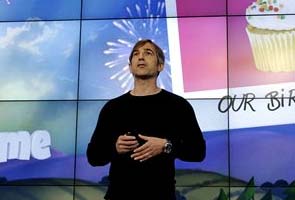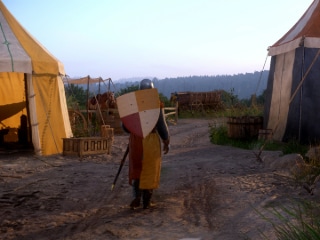- Home
- Social networking
- Social networking Features
- In conversation with Mark Pincus, CEO Zynga
In conversation with Mark Pincus, CEO Zynga

Mark Pincus - the other Mark of Silicon Valley - helped usher in the Facebook era with catchy games that got people clicking on virtual cows and building virtual cities while staying on Facebook for hours on end.
Named after Pincus's late American Bulldog, Zynga, the company that gave us "FarmVille," ''CityVille" and "Bubble Safari" is now stretching the limits of its Facebook leash by steering players to its own digital gaming hub.
Tuesday marked the second Zynga Unleashed event at the company's sprawling San Francisco headquarters. Last year, it used the occasion to launch what was then known as "Project Z," a place for people to play Zynga games on the company's own platform, rather than on a social network such as Facebook. This year brought more games and new social-networking features centered on gaming.
"Project Z" is now Zynga.com. It's a place separate from Facebook, sure, but much as a clever canine that knows not to steer too far from its human companion, Zynga isn't leaving Facebook behind. People who want to play games on Zynga.com still use their Facebook identities to log in. Once there, though, it's a place free of status updates, news links and baby photos that clutter Facebook. Instead, it's all about games.
Zynga wasn't Pincus's first project, but it's by far the biggest. The Chicago-born Harvard Business School graduate founded an early social network, Tribe.net, in 2003. Tribe was created to let people form online communities around shared interests, but it never gained the kind of following that Friendster and MySpace would just a couple years later. He also founded FreeLoader Inc., an Internet technology startup he sold for $38 million.
Pincus recognized the promise of social networks early on. He was one of Facebook Inc.'s earliest investors. And in 2003, he and LinkedIn founder Reid Hoffman, bought a "broad and sweeping" patent covering social networking, wrote David Kirkpatrick in "The Facebook Effect." Hoffman told Kirkpatrick that the purchase was a defensive move, "to make sure no one would kill the nascent industry" by using such a patent to block emerging networks.
Pincus says he was a "serial entrepreneur" before Zynga because he "failed to create a long-term, sustainable company." Now 46, Pincus spoke with The Associated Press recently by telephone from Zynga's headquarters in San Francisco. Here are excerpts, edited for clarity and style:
Q: There is a lot of money in Silicon Valley right now. How does it compare with what was happening in the '90s?
Mark Pincus: There are so many ways I think this is different. The most fundamental difference is that we are seeing consumer Internet services delivering a lot more of the promise that everyone saw 12 years ago. It's happening faster. And the size of the audience that successful applications are reaching seems to be getting bigger and bigger.
The second difference is I think that there is a much more sustainable, scalable, profitable business model behind successful products and services that can sustain these companies. And the third difference that goes along with the first two is that Silicon Valley, the culture and the entrepreneurs have grown up. Even the younger ones show so much more maturity than 12 years ago. You see the companies that are growing up today want to build long-term, sustainable consumer brands and franchises.
Q: How is it different for you, with Zynga?
Mark Pincus: The way I describe my career is that I've been a serial entrepreneur before Zynga because I failed to create a long-term, sustainable company. Not by choice. So what's different for me is that we've gotten someplace where we can invest in a single company and brand and product on the long run. It's much more fulfilling. I've never had this kind of opportunity before in my career. I've never been able to bring products to market that could be quickly seen and loved by millions of people.
Q: And that was because of Facebook?
Mark Pincus: Facebook has been a key catalyst and enabler. These open platforms that are enabling new products to get to broad audiences much quicker. Facebook, iPhone, Android, Google opening up. This whole environment of open platform makes it possible for great products to get to the mass market.
Q: Where would you like to see social games go from here?
Mark Pincus: The promise of games for everyday people is still so much greater than the experience that everyone has today. The overall tectonic shifts that are going on in games and more broadly in media are that everything is moving to becoming free, social and accessible. But we're just at the beginning of that. We can get to a day where short-session play can enhance, if not replace text messaging as a way to stay in touch with people.
Q: So kind of like the chat that people do right now in "Words With Friends" but an evolution of that?
Mark Pincus: Yeah. I call it pokes with a purpose. The idea that we're all on the go and running around and we are looking for ways to keep in touch with so many people. That's one of the reasons why Facebook has been so important for so many people. And Twitter, and social media.
Games can give you a new dimension, but we have to make them. We still have to go a ways to package them more so that they are a poke with a purpose but not a rulebook that's asking for a lot of your time. "Words With Friends" and "Draw Something" and "Scramble With Friends" start to kind of poke at that, at what that future could look like.
Q: Is that future mainly on mobile devices? Does this mean that you guys are moving away from the Web and from Facebook?
Mark Pincus: No, each of these mediums offers different kinds of exciting experiences. We still use the radio. We still use TV, and I'm a long-term believer in the PC. We still sit down in front of one at work. I just think the PC as when you sit down for a meal, and when you are on the go and want a snack you are on your mobile device. They need to talk more to each other, those experiences.
I still believe that we can offer you a much deeper, more engaging, more compelling play experience on a PC than we can on a mobile device, but one can enhance the other and one can expand the other. I don't think they necessarily will compete with each other, just like how we find a place for movies in our lives, and TV and radio. The same will be true between a handset a tablet and a PC.
Q: Have any games that Zynga has come out with been a disappointment to you?
Mark Pincus: Yes. Although I'm happy to say there's more that were disappointments that never saw the light of day that those that have been disappointments that have seen the light of day. But we are a learning company and a learning industry and we learn quickly. Last year "Mafia Wars 2" was a disappointment and a learning experience for us.
We didn't get the game down to a fun, core, playable flight that we could go out and test with real people early enough. These projects can take on a life of their own and get big. And we had such a passionate connection with "Mafia Wars" and we were in love with the idea of a graphical version of it that we were more committed to that than we were to getting something fun out early.
Q: Can you talk about Zynga's culture and how Zynga is run differently from other Silicon Valley companies?
Mark Pincus: The idea that we are building a house that we want to live in is something that's very fundamental to who we are. I wanted to create an enduring community and an enduring institution almost from day one.
About every other week I sit down with all of our new Zynga hires and I talk to them for about 90 minutes, have an open Q&A. There is no formal presentation. I talk about our values, where they came from and why they are so important and I ask them to challenge those values.
An important, fundamental part of our culture is that we think that every person in the company should feel like a principal, an owner, a founder of this vision. And they should challenge the vision, the mission, the strategy, and the values. Sometimes we change the values based on those challenges, and sometimes we need our teams to call out that we are not living up to those values.
Our No. 1 value is that we are making products that we love, that we think us and our friends and family want to play. The first thing I say to new hires is that if you are working on a game and you don't feel connected to it or love for it, don't be embarrassed to talk about it.
It's a culture that is very much about being an entrepreneur and a CEO. For many people that's refreshing and exactly what they are looking for in their career. We were structured to be a great place for highly ambitious people. Sixty percent of our workforce has leveled up every year for the last four years, meaning that 15 percent every quarter have taken on greater responsibility, jobs, compensation. That's unique in a bigger company.
Q: So that's Zynga's way of keeping employees happy? To give them more responsibility?
Mark Pincus: Our goal is that employees feel like they have more career opportunity here than any company on the planet. We have such a need for leadership at our company and in our industry. We are searching for leaders. I regularly encourage employees to break rules. I also say to employees that leadership starts with complaining and dissatisfaction. But it doesn't stop there. It comes from saying you're dissatisfied with something and then fixing it and making it better for everybody.
A lot of the values and the culture come from me. Because I am invested in this. And I ask everyone who comes here to put their own footprint on this, their own fingerprint and mine are for sure here to.
I have a strong sense of democracy and fairness and so we work really hard to be an extreme meritocracy. I don't believe in the clubs of Silicon Valley. I don't believe in like the founders circle or the sense that you should have been employee 1 through 100. Everyone who walks in has the same opportunity to be a huge leader and to be compensated for being a great entrepreneur. And we work really had to be a really flat organization.
Q: Zynga still makes a lot of its revenue through Facebook. Should this worry people, and is it going to change?
Mark Pincus: It has been hugely positive for us, for Facebook and for both of our consumers. Facebook has been an incredible catalyst, an accelerator, of social gaming and of other industries. And we are appreciative of that and we think that we helped see a significant catalyst for engagement on their own platform, and now on iPhone as well.
But with that will come interdependency. We've seen that in other industries. Cable TV, you know you've got HBO owned by Time Warner it's served up by AT&T or Comcast who are often direct competitors with each other. But they all collaborate for the benefit of the end consumer.
Q: But you also launched your own platform. So it seems like you're also interested in making Zynga its own platform and its own brand so it's not just the company that makes games for Facebook.
Mark Pincus: It's important for us to have a direct branded relationship with our consumers. We created Zynga.com because we wanted to offer a dedicated destination for social gaming. It's something that is all about social gaming only and can go beyond what we can do on other platforms. But it leverages the best of what we get with Facebook.
Q: What do you do for fun?
Mark Pincus: The biggest source of fun and use of my time outside of work is my girls, my daughters. They are definitely teaching me to enjoy a lot of the simpler things in life. Like my one daughter, she is now obsessed with swimming and going underwater, to the point where she sleeps in her bathing suit. I was just kind of rediscovering things through them. Outside of that, I have developed an addiction to surfing. I can't say I'm very good at it but I'm trying a lot and it's fun. There's a surfing community even inside Zynga, so I've gotten to know people inside Zynga at different levels through surfing.
I love soccer but - I don't know. Maybe I'm feeling my age, but after I haven't played in six months I went out to play a game for Zynga against Twitter. Twitter's CEO is a really good soccer player and he didn't even make it to the game, so I was proud that I was the only CEO that showed up. But after about 10 minutes I tore my calf. So that limited my soccer and cycling careers for a little while.
Get your daily dose of tech news, reviews, and insights, in under 80 characters on Gadgets 360 Turbo. Connect with fellow tech lovers on our Forum. Follow us on X, Facebook, WhatsApp, Threads and Google News for instant updates. Catch all the action on our YouTube channel.
- Samsung Galaxy Unpacked 2026
- iPhone 17 Pro Max
- ChatGPT
- iOS 26
- Laptop Under 50000
- Smartwatch Under 10000
- Apple Vision Pro
- Oneplus 12
- OnePlus Nord CE 3 Lite 5G
- iPhone 13
- Xiaomi 14 Pro
- Oppo Find N3
- Tecno Spark Go (2023)
- Realme V30
- Best Phones Under 25000
- Samsung Galaxy S24 Series
- Cryptocurrency
- iQoo 12
- Samsung Galaxy S24 Ultra
- Giottus
- Samsung Galaxy Z Flip 5
- Apple 'Scary Fast'
- Housefull 5
- GoPro Hero 12 Black Review
- Invincible Season 2
- JioGlass
- HD Ready TV
- Latest Mobile Phones
- Compare Phones
- Tecno Pova Curve 2 5G
- Lava Yuva Star 3
- Honor X6d
- OPPO K14x 5G
- Samsung Galaxy F70e 5G
- iQOO 15 Ultra
- OPPO A6v 5G
- OPPO A6i+ 5G
- Asus Vivobook 16 (M1605NAQ)
- Asus Vivobook 15 (2026)
- Brave Ark 2-in-1
- Black Shark Gaming Tablet
- boAt Chrome Iris
- HMD Watch P1
- Haier H5E Series
- Acerpure Nitro Z Series 100-inch QLED TV
- Asus ROG Ally
- Nintendo Switch Lite
- Haier 1.6 Ton 5 Star Inverter Split AC (HSU19G-MZAID5BN-INV)
- Haier 1.6 Ton 5 Star Inverter Split AC (HSU19G-MZAIM5BN-INV)


![[Partner Content] OPPO Reno15 Series: AI Portrait Camera, Popout and First Compact Reno](https://www.gadgets360.com/static/mobile/images/spacer.png)









